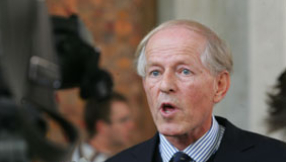If you're familiar with church culture then you'll know that the possible answers for this question are "good", "well", and "I'm fine". Or, if you're particularly versed in the Christianese of certain circles then you'll be "blessed and highly favoured".
So often many of us trot out these autofill responses without much second thought, and I'm just as guilty of this as the next person. I once challenged myself one Sunday to honestly answer when someone asked how I was, but as earnest as my good intentions were, it barely lasted a round of tea and biscuits after church.
If you've sat under the preaching of dubious theology you may have been told that to admit hardships or bad times is a sign of a lack of faith. Within the 'name it and claim it' philosophy, to admit struggle is tantamount to cursing yourself; while others may be quick to remind us that we should "count it all as joy".
While the curt response of "it is well" to any suggestion of things being anything but is a great tactic of deflection, ultimately such responses hold our fellow Christians at arm's length and are a misrepresentation of the gospel to non-Christians.
Christianity is sometimes sold as a remedy for all of life's problems, which only confirms the notion that our faith is a fantasy we hold on to in order to avoid dealing with the not-so-pleasant aspects of life. The infamous church gossip culture has been encouraged in congregations where hiding weakness is a corporate habit, right up to the highest levels of church leadership. It is easy to demand transparency and accountability among our spiritual leaders, but what about the rest of us? Surely it's just as important for us to answer the hard questions when asked, even if it is a simple "How have you been?"
There have been times where I've purposely avoided church, thinking that I'll return the following week when I've 'got my act together' and do not have to put the effort into concealing troubles behind a tight smile. As hard a habit as it is to break, I'm ashamed of my immaturity and pride. Part and parcel of living in this context of the body of believers is that we should be open each other, as we truly live life together.
The words of Paul in 2 Corinthians 1:4 have challenged me as I consider that I experience things in order to be of comfort to those who may be going through something similar. But how can I be of comfort if I'm more concerned with concealing?
The capacity for meaningful human connection is limited when we shy away from expressing the full range of genuine emotion. We also make it hard for others to do the same and the silent message received is the expectation that other Christians should also 'keep it together'. Do we fear that admitting doubt, fear or hardship undermines the glory of God, or the power of the gospel? Well, it would, if either were about simply making us as individuals consistently happy, but they're not.
Jesus didn't preach a gospel of never-ending rainbows and consistent sunshine, but he did represent a God who is there for broken people whatever the weather, whether that is us personally, or us creating a space for our fellow Christians to express themselves honestly.
As I lurch from the highs of life to the lows and back, I'm comforted by the fact that I've not just been saved (past tense) with the expectation that everything should be perfect from now on. The real beauty of salvation is that we're continually being saved: saved from our sins, saved from the mistakes we continue to make and the hard situations in which we find ourselves.. This isn't the kind of saved which means we skate through life on a constant cloud, but the kind that brings us intimate knowledge of divine grace and love.
And by knowing this grace and love we are able to be vulnerable enough to be transparent with others, and in turn, extend grace to them to be transparent with us. This can be a powerful example to those who believe and those who don't that the Christian life is not an exercise in tightrope walking the fine line of perceived perfection, but a lived experience of God's consistent work in our lives: saving, healing and restoring in the midst of life's storms.
Jendella is a writer, photographer and filmmaker based in London. Her work has appeared in The Guardian and also been exhibited internationally. She can be found on Twitter – @JENDELLA – and also at www.jendella.co.uk.













